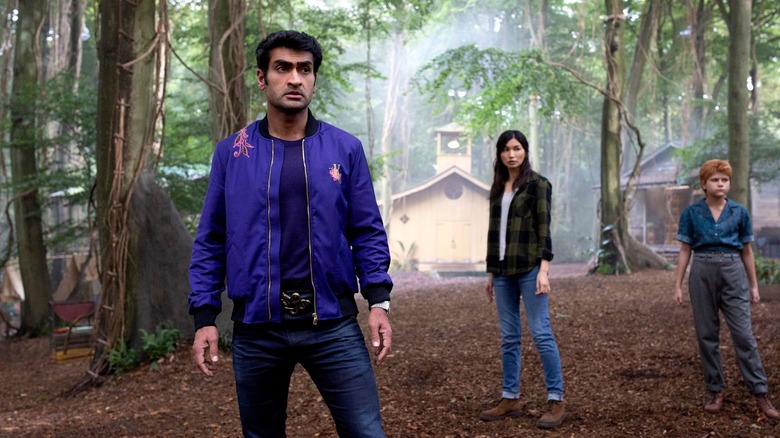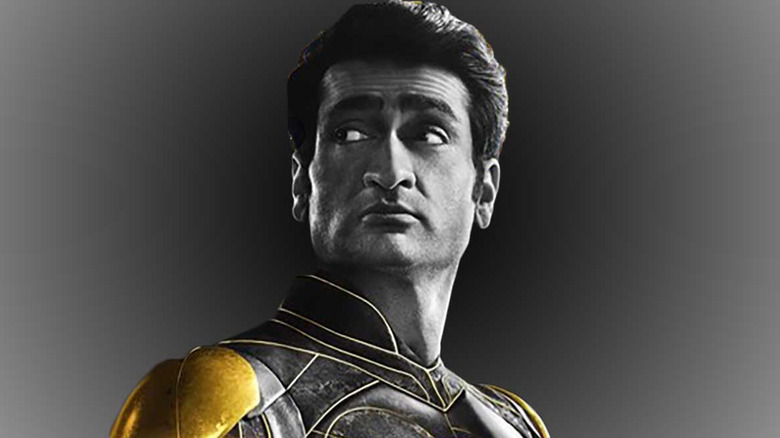Eternals Screenwriter Reveals Why Kingo Sat Out The Final Fight [Exclusive]
When an ostensibly crowd-pleasing superhero movie ends up with as much of a mixed reaction as "Eternals" did, there are bound to be several very specific elements that can be singled out as divisive. Although the narrative to this point has largely focused on how Chloé Zhao's singular vision proved to be at fundamental odds with the more conventional approach that Marvel Studios prefers to run things, the truth would seem to be that the film was a very smooth collaboration between Zhao and the other credited writers on the screenplay — Patrick Burleigh, Ryan Firpo, and Kaz Firpo.
One such element in "Eternals" that had many critics and viewers scratching their heads was the decision to have Kingo, played by Kumail Nanjiani, willingly sit out almost the entirety of the final act after stealing so many scenes in the movie beforehand. Zhao herself has weighed in on this aspect previously, explaining to Uproxx:
"Kingo is an extremely complex character. He loves Earth, but he has strong beliefs, just like Ikaris. He's no different than Ikaris in terms of his faith for the Celestials and believing in the greater good: The fact that human beings and Earth doesn't have the right to break out of the natural order. He believes that. However, the big difference between him and Ikaris is that he might believe something personally, but he does not believe that he should hurt other people for his beliefs."
Until now, however, we haven't heard from the other "Eternals" writers about the reasoning that went behind this unexpected choice. /Film was given the opportunity to talk with two of the writers of "Eternals," who were more than happy to oblige.
A 'Mortal Eternal'
Who expected "Eternals" to willfully sideline a key member of its ensemble right at the most important part of the story? Just as we discover Ikaris' (Richard Madden) betrayal of the Eternals and anticipate the third act battle to prevent the birth of a new Celestial and the destruction of the entire planet, Kingo announces his intentions to step back entirely and let the two opposing groups fight it out between themselves.
It's a bewildering and jarring moment, which /Film's Jacob Hall touched upon during an interview with sibling writers Ryan Firpo and Kaz Firpo. Like Zhao, Ryan made it clear that this was no spur-of-the-moment whim on their part:
"That's something that we came up with early on, and [Producer Nate Moore] and everybody at Marvel was really supportive of that idea. And I think that a conscientious objector is the perfect description. That's really kind of what's going on, yet he can both align himself with Ikaris and his beliefs, and his ideologies about the Celestials, and the importance of their mission, but not want to hurt his family, and not want this big fight against people that he loves. I also think that there is an element for Kingo. He's one of the more kind of, I guess, mortal Eternals. He's been living as a mortal, very public-facing mortal, or living as a human, a public-facing human for a very long time now. And I think that he ... understands them, and feels them in a way that maybe some of the other Eternals don't.
"...But also, it's a fear of his own mortality. It's finally coming to face with the idea that, 'I could die,' and he doesn't want to die. He likes to be alive. And so there's also a choice being made there about, he believes this'll be certain death, but if he sits this out, then a Celestial can be born and he has the chance to basically continue on, perhaps on another planet."
Personally, I found Kingo's refusal to fight to be one of the most interesting parts of "Eternals." There aren't many South Asian characters in major blockbusters to begin with, let alone one who is allowed to be brash and complex and even — depending on your perspective — flat-out wrong. Idealism is nice, but flawed, deeply human characters are even better.
"Eternals" is currently playing in theaters.

